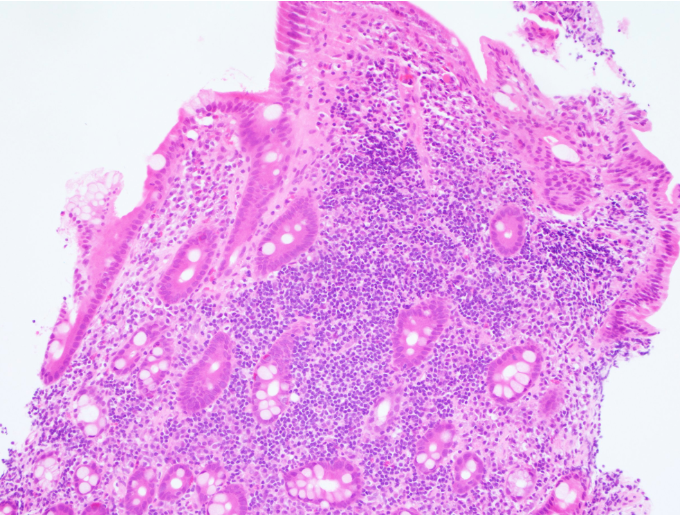Tuesday Poster Session
Category: Small Intestine
P6268 - A Rare Case of Duodenal Extranodal Marginal Zone B-cell Lymphoma of Malt-Type
Tuesday, October 28, 2025
10:30 AM - 4:00 PM PDT
Location: Exhibit Hall
- FS
Fozia Syed, MD
NYU Langone Health, NY
Presenting Author(s)
Fozia Syed, MD, Daniela Romero, MD, Leilah Tisheh, MD, Sabrina Bulancea, MD, Nicholas Ward, MD, Prakash Viswanathan, MD, Pranay Srivastava, MD
NYU Langone Health, Patchogue, NY
Introduction: Extranodal marginal zone lymphoma (EMZL), also known as mucosa-associated lymphoid tissue (MALT) lymphoma, is a type of indolent B-cell non-Hodgkin lymphoma (NHL) that originates from marginal zone B-cells. While MALT lymphoma is common in the stomach, the duodenum is less frequently involved.
Case Description/
Methods: A 67-year-old male with a past medical history of DM, HTN and atrial fibrillation presented to the emergency room with two days of dizziness and shortness of breath, along with dark-colored stools for an unspecified amount of time. Hemoglobin was 6.4 and an ECG showed atrial fibrillation with rapid ventricular rate. A CT abdomen and pelvis revealed extensive retroperitoneal and thoracic lymphadenopathy with splenomegaly. He was hospitalized, received blood transfusions and underwent cardioversion. Subsequently, an esophagogastroduodenoscopy(EGD) demonstrated one non-obstructing cratered duodenal ulcer in the duodenal bulb surrounded by abnormal and inflamed villous mucosa. The ulcer biopsy was consistent with extranodal MALT lymphoma, showing intestinal mucosa featuring an underlying dense lymphoplasmacytic infiltrate with resultant effacement of normal glandular architecture by an immunophenotypically aberrant CD20(+)BCL2(+) small B lymphocyte population with evidence of lambda light chain restriction by in-situ hybridization staining. Molecular testing regarding B-cell clonality was reported as positive for a clonal immunoglobulin gene rearrangement; tissue was Helicobacter pylori-negative.
Discussion: Duodenal MALT lymphoma is rare; commonly presenting as nodular lesions. Duodenal MALT lymphoma can be asymptomatic in the early stages; most common symptoms include malabsorption, diarrhea and melena. Duodenal MALT lymphoma treatment and outcomes are not well established due to disease rarity; options include radiation therapy, surgical resection, single or combination of H. pylori eradication, and chemotherapy. Tumor biopsy of the duodenal MALT can be tested for H. pylori and Campylobacter jejuni, and be treated with antibiotics if biopsy is positive. If duodenum MALT lymphoma is confined to the duodenum or limited to regional lymph nodes, radiation therapy can be utilized. If the MALT lymphoma is a non-limited-stage disease, systemic chemotherapy can be administered. The initial treatment regimen of choice is rituximab, cyclophosphamide, doxorubicin, vincristine, and prednisone (R-CHOP)or rituximab, polatuzumab vedotin, cyclophosphamide, doxorubicin, and prednisone(R-pola-CHP).

Figure: Hematoxylin and eosin stained section from duodenum showing underlying effacement by a dense lymphoplasmacytic infiltrate [magnification ×40].
Disclosures:
Fozia Syed indicated no relevant financial relationships.
Daniela Romero indicated no relevant financial relationships.
Leilah Tisheh indicated no relevant financial relationships.
Sabrina Bulancea indicated no relevant financial relationships.
Nicholas Ward indicated no relevant financial relationships.
Prakash Viswanathan indicated no relevant financial relationships.
Pranay Srivastava indicated no relevant financial relationships.
Fozia Syed, MD, Daniela Romero, MD, Leilah Tisheh, MD, Sabrina Bulancea, MD, Nicholas Ward, MD, Prakash Viswanathan, MD, Pranay Srivastava, MD. P6268 - A Rare Case of Duodenal Extranodal Marginal Zone B-cell Lymphoma of Malt-Type, ACG 2025 Annual Scientific Meeting Abstracts. Phoenix, AZ: American College of Gastroenterology.
NYU Langone Health, Patchogue, NY
Introduction: Extranodal marginal zone lymphoma (EMZL), also known as mucosa-associated lymphoid tissue (MALT) lymphoma, is a type of indolent B-cell non-Hodgkin lymphoma (NHL) that originates from marginal zone B-cells. While MALT lymphoma is common in the stomach, the duodenum is less frequently involved.
Case Description/
Methods: A 67-year-old male with a past medical history of DM, HTN and atrial fibrillation presented to the emergency room with two days of dizziness and shortness of breath, along with dark-colored stools for an unspecified amount of time. Hemoglobin was 6.4 and an ECG showed atrial fibrillation with rapid ventricular rate. A CT abdomen and pelvis revealed extensive retroperitoneal and thoracic lymphadenopathy with splenomegaly. He was hospitalized, received blood transfusions and underwent cardioversion. Subsequently, an esophagogastroduodenoscopy(EGD) demonstrated one non-obstructing cratered duodenal ulcer in the duodenal bulb surrounded by abnormal and inflamed villous mucosa. The ulcer biopsy was consistent with extranodal MALT lymphoma, showing intestinal mucosa featuring an underlying dense lymphoplasmacytic infiltrate with resultant effacement of normal glandular architecture by an immunophenotypically aberrant CD20(+)BCL2(+) small B lymphocyte population with evidence of lambda light chain restriction by in-situ hybridization staining. Molecular testing regarding B-cell clonality was reported as positive for a clonal immunoglobulin gene rearrangement; tissue was Helicobacter pylori-negative.
Discussion: Duodenal MALT lymphoma is rare; commonly presenting as nodular lesions. Duodenal MALT lymphoma can be asymptomatic in the early stages; most common symptoms include malabsorption, diarrhea and melena. Duodenal MALT lymphoma treatment and outcomes are not well established due to disease rarity; options include radiation therapy, surgical resection, single or combination of H. pylori eradication, and chemotherapy. Tumor biopsy of the duodenal MALT can be tested for H. pylori and Campylobacter jejuni, and be treated with antibiotics if biopsy is positive. If duodenum MALT lymphoma is confined to the duodenum or limited to regional lymph nodes, radiation therapy can be utilized. If the MALT lymphoma is a non-limited-stage disease, systemic chemotherapy can be administered. The initial treatment regimen of choice is rituximab, cyclophosphamide, doxorubicin, vincristine, and prednisone (R-CHOP)or rituximab, polatuzumab vedotin, cyclophosphamide, doxorubicin, and prednisone(R-pola-CHP).

Figure: Hematoxylin and eosin stained section from duodenum showing underlying effacement by a dense lymphoplasmacytic infiltrate [magnification ×40].
Disclosures:
Fozia Syed indicated no relevant financial relationships.
Daniela Romero indicated no relevant financial relationships.
Leilah Tisheh indicated no relevant financial relationships.
Sabrina Bulancea indicated no relevant financial relationships.
Nicholas Ward indicated no relevant financial relationships.
Prakash Viswanathan indicated no relevant financial relationships.
Pranay Srivastava indicated no relevant financial relationships.
Fozia Syed, MD, Daniela Romero, MD, Leilah Tisheh, MD, Sabrina Bulancea, MD, Nicholas Ward, MD, Prakash Viswanathan, MD, Pranay Srivastava, MD. P6268 - A Rare Case of Duodenal Extranodal Marginal Zone B-cell Lymphoma of Malt-Type, ACG 2025 Annual Scientific Meeting Abstracts. Phoenix, AZ: American College of Gastroenterology.
